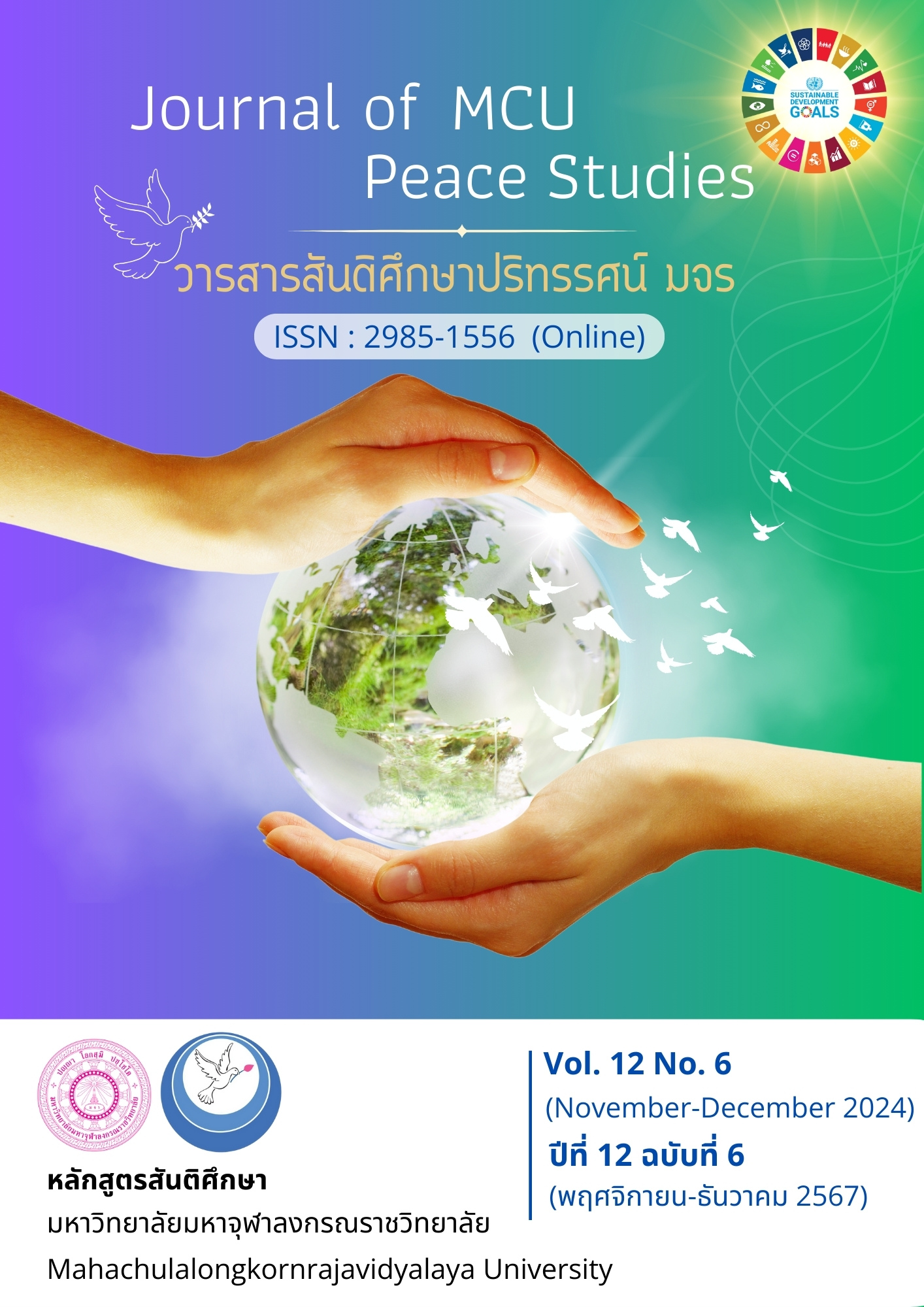การพัฒนาจุดหมายปลายทางการท่องเที่ยวแบบคาร์บอนต่ำอย่างยั่งยืน
Main Article Content
บทคัดย่อ
การศึกษาครั้งนี้มีวัตถุประสงค์เพื่อศึกษาการพัฒนาจุดหมายปลายทางการท่องเที่ยวแบบคาร์บอนต่ำอย่างยั่งยืน โดยการทบทวนวรรณกรรมจากแนวคิด ความหมาย และงานวิชาการที่เกี่ยวข้อง ซึ่งสามารถนำมาซึ่งแนวทางความความสอดคล้องกันของแนวคิดต่าง ๆ ในการที่จะพัฒนาพื้นที่ต่าง ๆ เพื่อการเป็นจุดหมายปลายทางการท่องเที่ยวแบบคาร์บอนต่ำอย่างยั่งยืนได้ อาทิ การมีการจัดการอย่างเป็นระบบและวางแผนดำเนินการอย่างชัดเจน การสร้างทัศนคติที่ดีรับผิดชอบต่อสังคมและสิ่งแวดล้อม การปรับเปลี่ยนพฤติกรรม การทำกิจกรรมที่ลดการปล่อยก๊าซคาร์บอนไดออกไซด์สู่โลก และ ชดเชยคาร์บอนที่ปล่อยออกไปในรูปแบบต่าง ๆ ตลอดจนการนำแนวคิด 7 Greens และ แนวคิด BCG มาประยุกต์ใช้ควบคู่ไปด้วยเพื่อก่อให้เกิดความยั่งยืนอย่างแท้จริง
Article Details

อนุญาตภายใต้เงื่อนไข Creative Commons Attribution-NonCommercial-NoDerivatives 4.0 International License.
ทัศนะและความคิดเห็นที่ปรากฏในบทความในวารสาร ถือเป็นความรับผิดชอบของผู้เขียนบทความนั้น และไม่ถือเป็นทัศนะและความรับผิดชอบของกองบรรณาธิการ ยินยอมว่าบทความเป็นลิขสิทธิ์ของวารสาร
เอกสารอ้างอิง
Bangkok Business. (2017). TAT Pushes "Tourism 4.0" to Move Economy. Retrieved May 3, 2023, from https://www.bangkokbiznews.com/news/detail/756663
Bangkok Life Assurance PLC. (2020). Happy Life.Retrieved May 3, 2023, from https://www.bangkoklife.com/emagazinehappylife/Issue/2563/10/LiveOffline/19
Bhaktikul, K., Aroonsrimorakot, S., & Laiphrakpam, M. (2021a). Sustainable Low-Carbon Community Development: A Study Based on a Royal Project for Highland Community Development in Thailand. Journal of Community Development Research (Humanities and Social Sciences), 14(2), 14-28.
Bhaktikul, K., Aroonsrimorakot, S., Laiphrakpam, M., & Paisantanakij, W. (2021b). Toward a Low-Carbon Tourism for Sustainable Development: A Study Based on a Royal Project for Highland Community Development in Chiang Rai, Thailand. Environment, Development and Sustainability, 23, 10743-10762.
Boontiangtham, P., & Huannakrang, S. (2012). A Study of Factors Affecting Tourism Decision Making Expectations and Satisfaction of Thai Tourists Visiting Floating Market in Taling Chan District, Bangkok. Journal of Graduate School Dhurakij Pundit University, 1(1), 840-852.
Designated Areas for Sustainable Tourism Administration. (2018). Tourism…for Whom? Retrieved May 3, 2023, from https://tis.dasta.or.th/dastaknowledge/wp-content/uploads/2018/ 06/Tourism-for-whom.pdf
______. (2023). Low Carbon Tourism. Retrieved May 3, 2023, from https://www.dasta.or.th
Fakfare, P., & Wattanacharoensil, W. (2023a). Low-Carbon Tourism: Determining Domestic Tourist Perception from Thailand: TOURISM AGENDA 2030. Tourism Review, 78(2), 496-516.
______. (2023b). Low-Carbon Tourism for Island Destinations: A Crucial Alternative for Sustainable Development. Sustainable Development, 31(1), 180-197.
Fakfare, P., Lee, J. S., & Han, H. (2022). Thailand Tourism: A Systematic Review. Journal of Travel & Tourism Marketing, 39(2), 188-214.
Gössling, S., & Higham, J. (2021). The Low-Carbon Imperative: Destination Management under Urgent Climate Change. Journal of Travel Research, 60(6), 1167-1179.
Ingkaphatanasakul, W. (2017). Environmental Management. National Research Council of Thailand. Retrieved May 3, 2023, from https://doi.nrct.go.th
Jaiuea, M. (2021). Low Carbon Tourism. Retrieved May 3, 2023, from https://tourism.utcc.ac.th
Kansuntisukmongkol, C. (2022). Natural Resource and Environmental Economics. Retrieved May 3, 2023, from https://www.econ.tu.ac.th
Koçak, E., Ulucak, R., & Ulucak, Z. Ş. (2020). The Impact of Tourism Developments on CO2 Emissions: An Advanced Panel Data Estimation. Tourism Management Perspectives, 33, 100611.
Lee, T. H., & Jan, F. H. (2019). The Low-Carbon Tourism Experience: A Multidimensional Scale Development. Journal of Hospitality & Tourism Research, 43(6), 890-918.
National Science and Technology Development Agency. (2020). What Is BCG Economy Model. Retrieved May 3, 2023, from https://www.nstda.or.th/home/knowledge_post/what-is-bcg-economy-model/
Potipituk, Ch. (2019). Suasive Measures in Environmental Management for Sustainable Low Carbon Communities. NRRU Community Research Journal, 13(2), 1-14.
Pongsakornrungsilp, P., & Pongsakornrungsilp, S. (2023). Mindful Tourism: Nothing Left Behind-Creating a Circular Economy Society for the Tourism Industry of Krabi, Thailand. Journal of Tourism Futures, 9(3), 366-380.
Puchongkawarin, C., & Ransikarbum, K. (2021). An Integrative Decision Support System for Improving Tourism Logistics and Public Transportation in Thailand. Tourism Planning & Development, 18(6), 614-629.
Tantiwasadakarn, C. (2022). Knowledge Development and Strategies for Multilateral Agreements between Countries on the Environment. Retrieved May 3, 2023, from https://digital.library.tu.ac.th
Thailand Greenhouse Gas Management Organization (Public Organization). (2021). Low-Carbon Tourism Management Guidelines in Thailand. Retrieved May 3, 2023, from http://www.dasta.or.th/attachments./article/475/1725-1835-0.pdf
The Government Public Relations Department. (2023). Encourage Agencies to Embrace the Sufficiency Economy Philosophy to Drive Sustainable Development, Aiming to Improve People's Well-Being in All Dimensions. Retrieved May 3, 2023, from https://www.prd. go.th/th/content/page/index/id/69958
University of the Thai Chamber of Commerce. (2021). Low Carbon Tourism. Retrieved September 28, 2023, from https://tourism.utcc.ac.th
Wang, Q., Mao, Z., Xian, L., & Liang, Z. (2019). A Study on the Coupling Coordination between Tourism and the Low-Carbon City. Asia Pacific Journal of Tourism Research, 24(6), 550-562.
Wongthanavasu, S. et al. (2019). The Khon Kean Model. Khon Kean: The College of Local Administration.
Zhang, J., & Zhang, Y. (2020). Low-Carbon Tourism System in an Urban Destination. Current Issues in Tourism, 23(13), 1688-1704.


